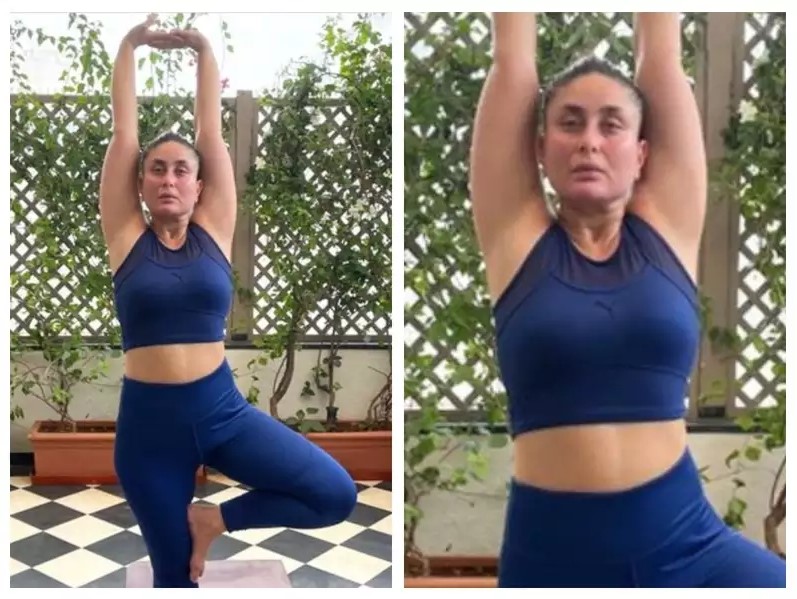Fitness in India: With the coronavirus pandemic confining people within the bounds of their homes on and off since March last year, the fitness industry also saw a major slump. Gyms and other fitness centres were seen to be one of the places where the virus would spread quickly, likely due to shared machines, towels, a lot of shared space, and the heavy breathing that came along with fitness, and so, the avenues to go out and exercise were shut off, at least for some time. While this was enough for fitness lovers to take up exercising from home, others started becoming conscious about their health when the lockdown kept on extending for months last year and they had no option but to take up fitness at home.
According to a report by mobile data and analytics provider App Annie, 2020 saw about 71,000 new fitness and health apps being launched, which was a 13% increase over 2019. Moreover, according to an article published on the World Economic Forum website, there was a 46% increase in downloads of health and fitness apps across the world between Q1 and Q2 of 2020, with India witnessing the highest increase in the downloads – of a whopping 156%. This, the report said, meant that there were 58 million new active users in the country. For instance, Indian health and fitness app HealthifyMe alone witnessed an increase of 5 million users during the pandemic, accounting for nearly a quarter of its user base of 21 million.
During the period of lockdown, not only did fitness apps see a surge in traffic, but video streaming platform YouTube also got flooded with tutorials and guides on exercising at home, be it for beginners or experts. Now, though the second wave of the pandemic has also come and gone and fitness institutions are beginning to open up again in several cities, it seems like just like the trend of remote working, fitness at home is also here to stay.
Talking to Financial Express Online, fitness equipment retailer Grand Slam Fitness Director Prateek Sood said, “From the rise of commercial gyms and online personal training sessions, the virus outbreak has steadily transformed the fitness industry. The industry is increasingly leveraging digital opportunities for a connected experience with customers. Classes covering everything from Zumba and Hooping to Yoga and Crossfit are being live streamed through digital tools. Home workout apps are witnessing a tremendous upsurge among millions in self isolation, helping them ease anxiety and stress caused by the crisis.”
He added, “Last year we saw a huge demand for home gym equipment from April to September. But this year we are seeing that individuals from Tier 2 cities want to invest in gym business due to increasing health issues. Coronavirus taught them that health is wealth and they have started investing in it. The spread of COVID-19 has encouraged brands to drive both a stronger online presence and discover new ways to connect with customers. Looking at the highly loyal and enthusiastic customer base, creativity and adaptability displayed by brands, the fitness industry will bounce back soon.”
Meanwhile, Nutritionist and Lifestyle Consultant Palak Chaturvedi told FE Online, “Home fitness has been in our lives for decades, plus it has taken on a new role since the pandemic closed gyms around the world. Many of us are trying to find ways to exercise effectively within the four walls. Video workouts are more popular than ever. It gives them access to new kinds of workout sessions that they wanted to try. We’re making a lot of investment there because we think that the industry is finding an en route instead. For me, as a researcher at heart, it’s been fascinating to watch the industry transform so rapidly. What the pandemic has done, I think, is that it’s accelerated a trend that was already in the making. It’s pushed the industry forward and forced a lot of change. The concept of remote fitness is here to stay and evolve into something much bigger.”
“While at-home fitness has been an emerging trend for the past decade, the pandemic has sky-rocketed at-home fitness and placed it front and center. Since gyms are one of the most high risk environments for the spread of COVID-19, they were one of the first places to shut doors as soon as the pandemic hit India. India had the largest lockdown in the world—from March 25 to May 2020, 1.3 billion people were instructed to stay inside. This has again repeated itself in subsequent waves and lockdowns. That’s a lot of people who, quite suddenly, found themselves at home, seeking physical & mental wellness. As a matter of fact, between Q1 and Q2 2020, health and fitness app downloads in India grew by 156% – The highest in the world. That translates to 58 million new active users—almost the entire population of Italy,” said Raunaq Singh Anand, Co-Founder of FitTech brand Flexnest.
Talking about the trend that was seen among people during this time, Head of Physiotherapy and Sports Medicine at Nanavati Max Super Speciality Hospital, Dr Ali Irani said, “In these last 15 months, the pandemic has taught us to do exercises at home. Our exercises have changed from gym and heavy weights to breathing exercises, Pranayam and Yogic exercises. Many have opted for Online Yoga, many have also chosen Online Pilates classes. So all the exercises were online.”
He also expected the trend in breathing exercises to continue in an upward graph. “In our experience at the hospital of more than 3,000 COVID positive patients, most of the patients had a vital capacity of less than 1.5 litres, much less than the lungs’ actual capacity of 4.5-5 litres. So, I think with time, we will understand that the most important thing for us are these different types of breathing exercises or Pranayam, which would increase our vital capacity. I believe that people will now also be looking at exercises that would build their immunity, so we are sort of going back to our sciences of naturopathy, ayurveda and unani.”
A similar opinion was also expressed by Palak. “Considering the number of increased cases and the presence of the Delta virus variant in the country, the benefits of home workouts and exercise at home can no longer be further undermined. Keeping one’s fitness journey prepares you by building your immunity from within. Even celebrities and sports personalities have worked out at home. They have made their living rooms into a gym and play/ exercise area. Sports retail brands estimate that fitness gear contributed to almost one-third of their total turnover share for 2020, and nearly 80% of those sales came from enthusiasts wishing to work out indoors.”
Fitness Industry in India: New tools, gadgets being sought
Palak said, “When the lockdown took effect, home-fitness business took off like wildfire. The rage of Fitness tracking gadgets and pieces of equipment are pretty much selling out. The smartphone makers have adapted to come out with prototype devices with built-in technology to get in sync with hardware for increased accuracy. From cardio machines to yoga mats, running and cycling gears keep the cash registers ringing. The download of fitness apps and sales of fitness wearables have increased as everyone is turning positively to the idea of a simple walk every day to be on the move. Apart from tools, it is also the online services of fitness experts that are making the waves in bringing health a new face within the home.”
Amit Khatri, the Co-Founder of smartwatch brand Noise, said, “From taking online yoga sessions to setting up a mini gym at home, fitness enthusiasts have become more conscious of their holistic wellness. They seek a health partner in their gadgets that supports them with intelligence on their physical and mental health. This deliberate demand has led to the amplified appetite for fitness gadgets like smartwatches which have become an essential gadget for round-the-clock health monitoring. Accordingly, we have witnessed phenomenal growth in the business and shipment for smartwatches in the past year. Another gadget that has gained significant attention from fitness enthusiasts is TWS earbuds, which they require for an uninterrupted and prolonged workout session. The demand for fitness gadgets will penetrate further in the coming days. Consumers are becoming more cognizant and intend to buy smart-tech devices equipped with features beyond fundamental functionalities like more insights on health, better battery life, improved aesthetics, and calling features at affordable pricing.”
Meanwhile, Raunaq said that Flexnest’s smart spin bike has also seen a lot of traction. “Flexnest sold out of their initial lot of 250 smart spin bikes in three weeks as consumers in India are eagerly looking for such solutions that Indian consumers have never seen before. Going forward, just like remote working, At-home fitness is a trend that is here to stay. As the pandemic starts to settle down and people start to step out, a large proportion of the population who have discovered the added convenience of working out from home and invested in connected fitness products will not be returning to the gym,” he opined.
Talking about the health aspect, Dr Irani said that the hospital received a team of physiotherapy equipment makers from Jodhpur, and the team was looking to understand the new equipment that were required by the doctors. “We showed them the spirometer, which measures vital capacity. At present, all the spirometers we have are imported, but now, this equipment maker is looking to produce made-in-India spirometers, so that is the new gadget or tool that we are looking at, as it would help measure the health of the lung. The way every home now has an oximeter, the next instrument, I believe, would be one that would help in measuring lung capacity.”
Fitness at home: What people are seeking for home gyms
Talking about the equipment that people are now looking at for making gyms at home, Palak said, “While home gyms traditionally had heavy equipment, the current trend for lighter fitness activities includes resistance bands, jump ropes, medicine ball, yoga mats, kettlebells, little and heavy dumbbells. Dumbbells come in different sizes, shapes, and materials these days, from plastic-coated to colourful to straight metal. Jumping rope is hands down one of the best ways to get a cardiovascular workout. It increases your heart rate quickly and also works your arms, shoulders, legs, and core. Resistance bands are one of the most versatile pieces of fitness equipment you can buy. You can target your entire body with resistance bands and mimic most machine-based strength moves. A foam roller is a great recovery and mobility tool, as well.”
Her view was mostly reiterated by Grand Slam Fitness’ Sood. “The pandemic has galvanised the development of gym equipment in large quantities and also, new devices to meet the demands of consumers who are early adopters. Working out at home with your own home gym equipment has some serious convenience benefits. There has been a sharp increase in the Home Gym Equipment category like Wattbike, an indoor cycle which is used by many key athletes and celebrities, Motorised Treadmill, “Multi Gym”, “Gym Equipment” and so on. Many are also opting for equipment which take up less surface area like dumbbells, stability ball, jump rope, heavy kettlebell, etc.”
Meanwhile, FitnessTalks Founder Pranit Shilimkar guided people on what they can use at home, saying, “Those who understand the balance of all components of fitness and want to set up a home gym do not have to invest a lot into it. For example, yoga mat, foam roller, pair of adjustable dumbells or a barbell, some plates and at max a bench is more than enough for someone to kick start their fitness journey which surely is better than nothing.”
Remote Fitness: Changes in the industry
Talking about the way the service providers are changing to adapt to the new demands, Sood said, “Amidst the coronavirus outbreak, the fitness industry has found itself in a more fortunate position. Some major B2B service providers are coming up with their gyms in smaller cities of India and making their position in the B2C segment due to a lesser impact of Covid in such cities. Companies are also helping people by setting up their own gyms at home keeping the current scenario in mind.”
Palak said, “The fitness industry is shifting from surviving the pandemic and looking for ways to thrive in the next normal, building consumer relationships that will last and grow. The service providers both inside and outside the home will need to reassess their value propositions, articulate their roles in consumers’ fitness routines, and commit to an approach that will win over the right consumers for them. Specifically, the service providers should consider a more hybrid proposition that keeps consumers digitally connected. Makers of in-home tools and equipment can lean into the normalization of DIY fitness and create tools to correctly channelise the available space for maximum benefit. The market is slowly yet surely adapting for the evolution which will gravitate around home fitness.”
She also spoke about the way some of the entities in this space performed. “Last year, HealthifyMe helped people collectively lose two million kilograms in nine months, against the previous year’s one million kilograms. They are not the only ones operating in the tech-driven diet-fitness space that claim to have benefited from 2020’s home-bound, immunity-chasing, fear-ridden India. Fitpass offers access through a single membership to over 4,000 gyms and fitness studios across 17 cities, and also has fitness and diet solutions. From October to December 2020, the business grew by 25-30% compared to the same time in 2019. Internationally, technology became a diet and fitness enabler about 15 years ago, going from calorie recorders to GPS-led fitness trackers, aggregators of studio classes, wearables, and now, AR screens that monitor training. All in all, players who have been steadily changing and evolving will ultimately perform far better than those who don’t.”
New trends in Fitness industry and the changing economics
Describing the new and popular trends, Palak said, “Wearable fitness technology like FitBits has become a common device that people use regularly to track their fitness levels and monitor themselves during their workouts. Group workouts have become incredibly popular and are generally conducted amongst a group of familiar people or who have some kind of common ground. High-Intensity workouts have proven to be incredibly beneficial for anyone who wants to partake in this fitness regime that can help get them into shape quickly. No one knows how long this trend will last and companies that can embed their technology into consumer habits and gain share will become highly valuable going forward. Companies that don’t have the resources to grow now may miss the wave. We are likely to see a lot of technology innovations in the fitness and gym industry as well as a great deal of capital coming into the industry to leverage the budding home fitness market.”
Describing the economics of the industry, Sood said, “Studies show that the market for home gym equipment is likely to grow at a CAGR of 9% in revenue from 2019-2025. Digital fitness tools, ranging from at-home connected fitness equipment to tech-smart apparel, offer on-demand workout sessions backed by real-time performance data. These offer flexibility, customisation and convenience. Being low in cost compared to a typical gym membership, users are looking forward to incorporating them into their fitness regimes long after the pandemic subsides.”
Just like the tech and the education industry, the pandemic has caused major changes to take place in the fitness industry. With people’s demands changing, the industry seems to have taken it in a stride and matched the demands with updated, suitable and flexible products. However, while several industry players believe that these innovations are here to stay as people are not likely to return to the rigidity of gymming, the actual impact of reopening of gyms and other fitness institutions would only be clear in due time.
CREDIT: FINANCIAL EXPRESS
















